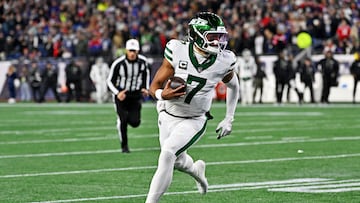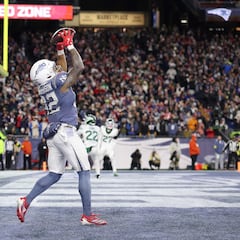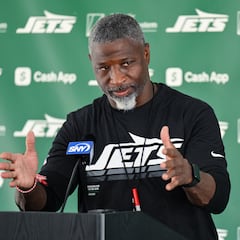Justin Fields was rolling… then Aaron Glenn shut him down
The run game was working for the New York Jets when they faced the Patriots, but head coach Aaron Glenn says QB is “not a running back” and shut it down.


The New York Jets opened Thursday night looking, for a brief moment, like a fully functional offense. Their first drive against the New England Patriots, a 14-play, 72-yard march down the field, ended with Justin Fields weaving into the end zone on a five-yard touchdown run. Fields ran the ball five times on that opening possession, threw just twice, and the Jets looked energized and unpredictable.
The Jets opening drive:
— Dov Kleiman (@NFL_DovKleiman) November 14, 2025
• 11 total rushes
• 3 total passes
• 2 passes from Justin Fields
• Fields rushing touchdown
The Patriots don't look like contenders...pic.twitter.com/xAux4q4hOK
And then… they stopped doing it. They ended up losing the game 27-14.
Glenn’s stance on Fields sparks questions
New York’s next three drives of the first half were all three-and-outs. Fields didn’t register a single rushing attempt on any of them. Each possession ended with an incompletion on third down. It was a clear shift that made an obvious negative difference.
Head coach Aaron Glenn defended the change in approach afterward, making it clear that leaning on Fields as a runner is not something the staff wants to rely on, even if it was working.
“We don’t want to make a habit of our quarterbacks continuing to run because we can put them in harm’s way,” Glenn said. “The thing is, we can’t put Justin in a situation where he’s a running back, and I think we all know that, because we’re putting him in harm’s way.”
Glenn mentioned that the Jets’ hot start was by design, starting with a fast, controlled pace, just enough designed runs to keep the defense off balance. But once the Jets had scored, the staff reined the rushing attempts back.
Fields finished with 11 carries for 67 yards, averaging 6.1 yards per rush, the most efficient part of the Jets’ offense by far. As a passer, Fields went 20-of-26 for 116 yards and took two sacks, producing a net of 105 yards on 28 dropbacks, or 3.8 yards per passing attempt. It’s not hard to see which side was moving the ball.
Jets QB Justin Fields faces mounting scrutiny after the Nov 13 loss to the Patriots. Despite posting 15/26 for 116 yards, 1 TD, plus 67 rushing yards and a rushing TD, critics slam his recent stretch of low-yardage outings. #JustinFields #FieldsToJets pic.twitter.com/oToUsusOBs
— Harrison Parker (@ParkerHarr3761) November 14, 2025
Still, Glenn insisted the imbalance couldn’t become a long-term plan, pointing instead to other offensive issues.
“We’ve got to have some guys make some plays for him too,” Glenn said, defending his quarterback while nudging his receivers.
Fields’ running ability has always been both his greatest asset and his biggest risk factor. It’s what makes him dynamic, and what makes coaches hyper-aware of the injury threat. But the Jets’ offense is still struggling, and Thursday night only deepened the tension. When Fields runs, the offense works. When he doesn’t, it doesn’t work. Yet the team doesn’t want sustainable success to hinge on their quarterback being their most explosive ball carrier.
Related stories
Get your game on! Whether you’re into NFL touchdowns, NBA buzzer-beaters, world-class soccer goals, or MLB home runs, our app has it all.
Dive into live coverage, expert insights, breaking news, exclusive videos, and more – plus, stay updated on the latest in current affairs and entertainment. Download now for all-access coverage, right at your fingertips – anytime, anywhere.


Complete your personal details to comment